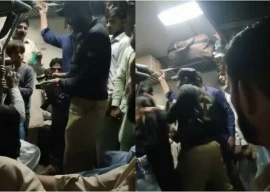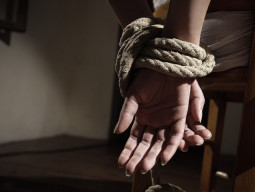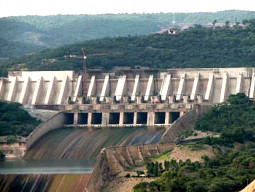
PESHAWAR:
The Peshawar High Court Bar Association (PHCBA) has strongly criticised the Judicial Commission of Pakistan’s (JCP) endorsement of four nominees for PHC judges.
On Friday, a JCP panel headed by Chief Justice Nasirul Mulk identified the four nominees as Muhammad Younas Thahim, Qalandar Ali Khan, Muhammad Ghuzafar Khan and Haider Ali Khan.
Speaking at a news conference at Peshawar Press Club on Saturday, PHCBA President Isa Khan insisted all judges had been recommended on the basis of cronyism rather than merit. He said the recommended judges were either class fellows or chamber fellows of JCP members. “Neither of the recommended judges is eligible to become a high court judge,” claimed Isa.

According to the PHCBA president, the JCP had accepted the recommendations of PHC Chief Justice Mazhar Alam Khan Miankhel despite negative reports about the nominees by various agencies.
Isa Khan criticised Justice Miankhel for not exercising his discretion in an appropriate manner. He insisted the CJ had only sent five names for five seats to the JCP. This reduced the scope for competition, he added.

According to the General Secretary of PHCBA, Muhammad Ayaz Khan, the new appointments have “completely destroyed” the dignity and decorum of the PHC. Ayaz also claimed the former chief justice of the high court had failed to confirm appointments of five competent judges due to mala fide intentions. They have been identified as Abdus Samad, Sher Muhammad Khan, Ziaur Rahman Khan, Sardar Shaukat Hayat and Imtiaz Khan. As a result, he termed the JCP’s recommendations as contentious.
The association said if they were not given a positive response, they would extend their movement to “protect the judiciary” and organise a sit-in outside PHC. Moreover, a provincial convention would be held to voice their dissatisfaction with the recommendations.
Published in The Express Tribune, October 19th, 2014.
COMMENTS (1)
Comments are moderated and generally will be posted if they are on-topic and not abusive.
For more information, please see our Comments FAQ






































In the ‘LAND OF PURE” everyone who sits in a position of authority believes that he has the right to be treated preferentially and the “LAW” is nothing but what he believes so. From the Member of Parliament, SP sahib, DC sahib, Commissioner Sahib, Secretary Sahib, tehsildar Sahib, patwari Sahib, naib qasid Sahib, and the list goes on. There has been a recent addition to the above list i.e. JUDGE SAHIB, Wakeel Shahib. Tehrik Insaf after all has restorted to Dharna when no one gave a fair hearing to Tehrek e Insaf at any forum including the corridors of justice. I will not comment on the justice that they hand over to the public lest I might be convicted of contempt of court, but wonder in utter shock and disappointment that the Chief Justice of Pakistan and Chief Justice of the provinces sit blind on the involvement of one District and Sessions Judge, D.I. Khan, Mr. Mohammad Rauf Khan of Karak. It’s not difficult to gauge the quality of justice that will be delivered in the corridors of justice. It has been now 6 years that the victims of this Judge are trying to get one/single impartial and objective hearing and decision from the Chief Justice of KP and Chief Justice of Supreme Court but have not been able to do so. The victim (who is the Uncle of the said District and Sessions Judge) has been begging before one court to another, but no outcome. The victim wrote applications to the Directorate of Human Rights Cell, Supreme Court but it seems to me that Chief Justice of KP and Supreme Court has no time to personally attend to such applications. Apart from that the lower staff at these Human Rights Cell dumps any application against District and Sessions Judge D. I. Khan because the said District and Sessions Judge might render them a favour in a bail or injunction order or in any civil or criminal case. The other resort is to file a Writ Petition before High Court KP. Filing a Writ Petition in these High Courts is a night mare. Because the said District and Sessions Judge has the power flowing from the District and Session Judge Chair, the staff at KP High Court schedules the Writ Petition before (the Judge of High Court who is usually approached by District and Sessions Judge D.I.Khan) that the said D& SJ wants and fix it on Cause List for a date that he wants.. Apparently, the current Chief Justice of KP who has been a lawyer in District D. I. Khan was approached by Mr. Muhammad Rauf District and Sessions Judge through his office and got himself off the hook in an inquiry. In another petition for the transfer of case from the court of District and Sessions Judge Karak to some other court in the Province (because the said D& SJ Karak was openly favouring his brother Judge D& SJ D.I.Khan) one justice of the KP High Court dismissed the petition on the ground that because the individual is D& SJ D.I. Khan therefore he knows every judge in the province and will influence any judge in the whole province. It is therefore not feasible to transfer the case from the court of District and Sessions Judge Karak to any other court. In lay man language the Honourable Judge of KP High Court was saying that there was not a single judge in the whole District Judiciary of the province who had the integrity to resist the influence of Mr. Mohammad Rauf Khan D& SJ District D. I. Khan. Therefore, there is no use to contest the transfer petition. Again the said Honourable Justice was a Justice from District D. I. Khan and was influenced by Mr. Mohammad Rauf District and Sessions Judge D. I. Khan. In the specific instance that I have explained, the conduct of the KP High Court is forcing the parties to resort to blood-shed because the High Court does not want to do justice. I wish that the golden words that the Chief justices utter at the Bar Association ceremonies apply it to themselves and fix their own house in order. The author having legal background is very well aware of the mess and rampant corruption in the corridors of Justice. One wonders that if it is so difficult to be heard against a District and Sessions Judge it won’t be a rocket science to understand what would be the fate of petition filed in Supreme Judicial Council. The moral of the story is that the sense of entitlement to be treated preferentially (even though he might not deserve it) is a strong deeply embedded feature of Pakistan’s culture. IK is still better that it has resorted to peaceful Dharna.